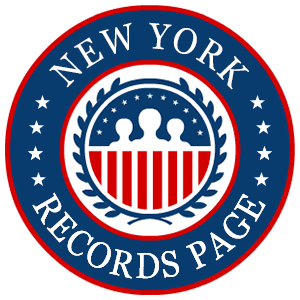Run a free New York warrant search right away to ensure no pending legal issues will impact your freedom. Knowing about a warrant is the first step in resolving it.
Warrant information is readily available to the public per state and federal public record laws. While these records are publicly accessible to citizens, knowing how to look up the details or submit a request to local record custodians is vital.
This streamlined resource gives searchers links to online databases — along with record custodian contact information — to make finding New York warrant details as seamless as possible.
The Availability of Warrant Records in NY
New York State doesn’t have a unified court system that makes all warrant information available in one place. In most cases, searchers will need to contact individual counties or cities for information pertaining to an incident in that district. Two types of warrants do have state lookup options: tax warrants and child support enforcement warrants.
The Freedom of Information Law (FOIL) grants New Yorkers broad rights of access to information gathered and maintained by public agencies.1 While FOIL protects a citizen’s right to access information and encourages transparency with constituents, most searchers likely won’t need an official FOIL request to gain access to warrant records in New York.
Some warrants information is restricted, such as search warrants that haven’t been served, but warrant information that doesn’t impact current law enforcement activities is generally available.
Most jurisdictions in New York will provide the information over the phone or via email, and some locales may have an online database you can use to run a warrant search.
Important Information for Running a New York Warrant Search
While technically, all that’s needed to start a warrant search is a person’s full legal name, many people may share the same name, so for accuracy a date of birth is also used in New York. The Criminal History Records Search (CHRS) statewide database is available for a fee of $95 per record.2 Adding information about where the person lives and any specific incidents that may have resulted in a warrant can help eliminate possible errors.
To check for warrants in New York, it’s best to start at the county level and narrow things down by city. Agency names may vary slightly based on the region, but this is a place to get started.
How To Check Warrants in NY on Yourself or Someone Else
New York State public records aren’t freely available through a statewide database where the public can search for warrants across all counties, but the Criminal History Records Search (CHRS) tool is a paid option. In addition, all jurisdictions have a warrant search option by mail, telephone or email, depending on the location.
For access to the CHRS, users must first fill out an application form and receive approval.3 All requests using this system require an exact match of the first name, last name and date of birth. Any inexact matches or errors will not return the requested results but will incur the same fee.
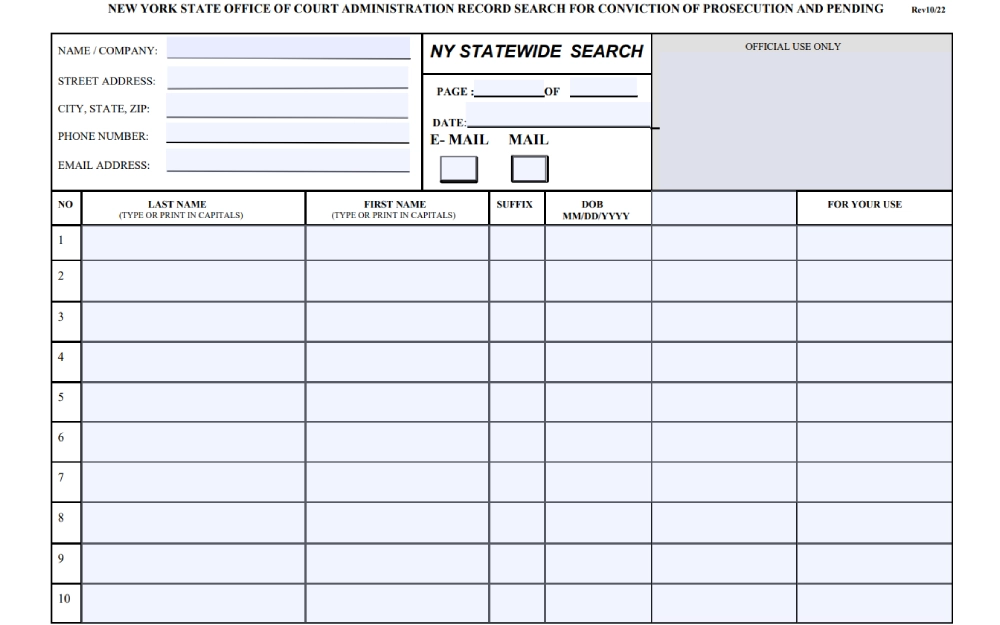
Check the CHRS FAQ to find out more about exclusions and records that may not be included in search results.
Another online option to find out about older, already executed warrants is the Department of Corrections Inmate Lookup tool.4 A search by last name, first name and birth year provides search results for those who have been convicted of crimes.
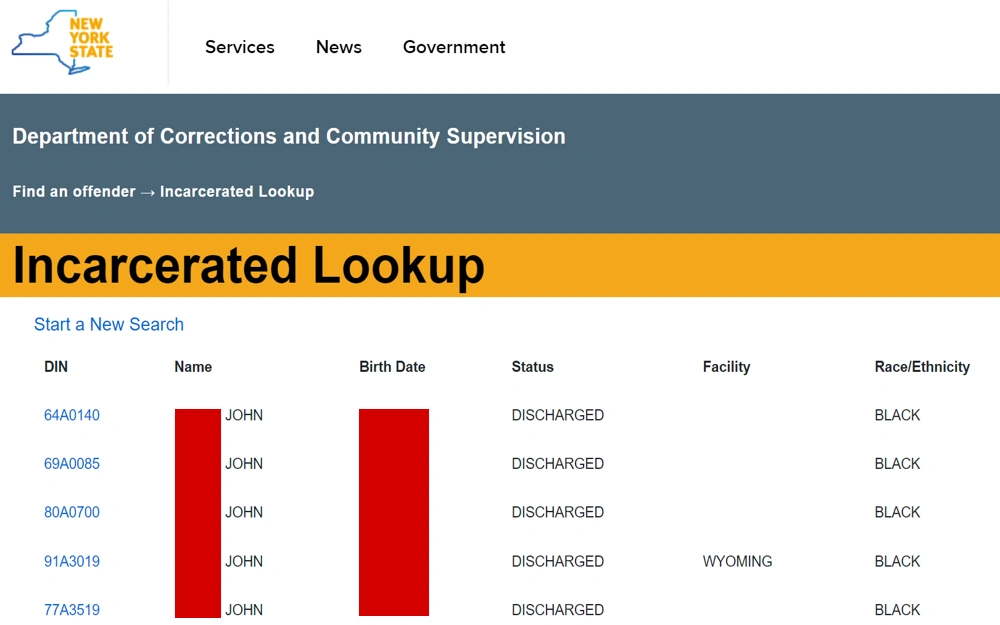
Wanted lists also contain information about those with active arrest warrants. The DoC’s Office of Special Investigations posts a Most Wanted list that contains mugshots, brief physical descriptions, information about their crime of conviction and contact information for the investigator in charge of the case.
Search for Warrants via County Agencies & Courts in New York
To run an in-person warrant search the county clerk’s office or local sheriff’s department are the most likely options for information. Be aware that if there’s an active warrant for the searcher, it may mean an immediate arrest. It’s often best to have a friend or family member run the search to avoid the potential issue.
Kings County: The best way to access information about active warrants in Kings County is through the County Clerk’s Office. Get in touch by visiting:
Kings County Clerk Supreme Court Bldg.
360 Adams St. Rm 189
Brooklyn, New York 11201
347.404.9772
[email protected]
You can also contact one of the many individual precincts that serve Kings County for information about a recent arrest.
Queens County: The Queens County Clerk’s Office has made its misdemeanor and non-criminal records available online for those who have the right information to look at a particular case.5
In order to see warrant information pertaining to a specific case, searchers will need the case index number, the name of either the defendant or plaintiff, the attorney of record for either party and the approximate date of the incident. Anyone seeking information can also get in touch in person at:
Queens County Clerk
88-11 Sutphin Boulevard, Room 106
Jamaica, NY 11435
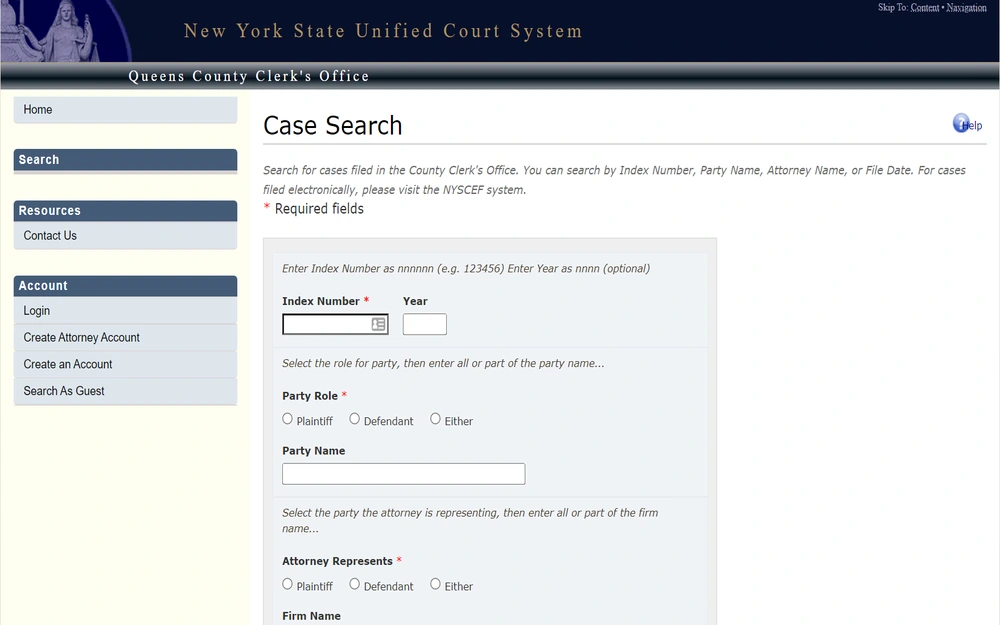
Mail-in requests may have a fee starting at $10, with additional charges per page printed. Contact the court in writing or by phone to ask about specific fees in advance.
Queens Supreme Court
Attn: Correspondence Unit – Room E121
125-01 Queens Blvd.
Kew Gardens, NY 11415
New York County: The County Clerk’s main office for New York County is located at:
New York County Courthouse
60 Centre Street, Room 161
New York, NY 10007
There are no online records access options, so for more information, a warrant search will require either a mail-in information request or a call to (646) 386-5955.
Suffolk County: While Suffolk County has many public records available online, warrants aren’t included. To review outstanding warrants in Suffolk County, visit the Sheriff’s Office at the address below or contact them by phone:
Suffolk County Sheriff’s Office
Civil Enforcement Bureau
100 Center Drive South
Riverhead, NY 11901
Nassau County: In Nassau County, warrant information isn’t posted publicly. Contact the enforcement division for information about how to access warrants or the county clerk’s office, or fill out a FOIL request online with the County Clerk or local police. For further insight into the best ways to look up local warrants, check out the Nassau County wanted person search tutorial.
Nassau County Sheriff’s Department – Enforcement Division
1490 Franklin Avenue
Mineola, NY 11501
Office of the Nassau County Clerk
240 Old Country Road
Mineola, NY 11501
Bronx County: Contact the Criminal Term Central Clerk’s Office for information about open warrants. Get general information in person at:
Bronx Criminal Court
Criminal Term Central Clerk’s Office
215 East 161st Street
Bronx, NY 10451
Information is also available via the Summons Clerk’s office by calling (718) 618-2480.
Westchester County: In Westchester County, obtaining warrant information starts with contacting police headquarters to ask about open and active warrants. The county posts a most wanted list for fugitives but doesn’t offer online access to general warrant records. Visit the police headquarters in person at:
Police Headquarters
1 Saw Mill River Parkway
Hawthorne, NY 10532
Erie County: Erie County maintains a public list of outstanding warrants that includes mugshots, a physical description and details of the crime they’ve been accused of committing. Not all warrant types will appear on this list, so for more information, visit the Erie County Sheriff’s Office at:
Erie County Sheriff’s Office
10 Delaware Avenue
Buffalo, NY 14202
Monroe County: Contact the Rochester City Court Criminal Division for information about warrants issued in the area. Visit in person at:
Rochester City Court
Criminal Division
123 Public Safety Building
150 South Plymouth Avenue
Rochester, NY 14614
Richmond County: To run a warrant search in Richmond County, contact the Clerk of Criminal Term at:6
13th Jurisdictional District
Clerk of Criminal Term
26 Central Avenue
Staten Island, NY 10301
(718) 675-8700
[email protected]
Obtain Arrest Warrant Details via Cities & Towns in New York
New York: New York City is broken down into five boroughs, each larger than every other city in the state. The city encompasses several counties, but it offers tools for a fast, telephone warrant search. At NYC 311 there are tools to help locate specific courts or police department for information requests.
The criminal court information line helps with access to information about open warrants — call (646) 386-4900.
In-person visits to the courthouse are also available, though visitors will need to bring a valid ID and may be subject to arrest if they do have an active warrant. It’s important to remember that warrants never expire, so if a warrant was ever issued and never resolved in court or by paying any outstanding debts, it’s likely still active. Information about open warrants is also stored at local police buildings.
Buffalo: Buffalo is located in Erie County, where the sheriff’s office posts a list of current, active warrants for those accused of a crime. Visit their website to search the fugitives list or stop by:7
Erie County Sheriff’s Office
10 Delaware Avenue
Buffalo, NY 14202
New Rochelle: The Records Unit of the New Rochelle Police Department handles all public information requests, including warrant searches. If you want to run a background check on yourself or someone you know, this is the agency to contact. Visit the office at:
New Rochelle Records Unit
475 North Avenue
New Rochelle, NY 10801
Albany: Albany City, located in the county of the same name, responds to online FOIL requests for warrant information. Send requests online or via the mail to:
City Clerk-Albany
Records Access Officer
24 Eagle Street, Room 202
Albany, NY 12207
Fees for completed FOIL requests start at $0.25 per page and can generate hundreds of pages of documents.
Another source for information specifically related to a police report related to the requester is to submit a query via email to [email protected]. FOIL requests can take up to 20 days to process.
Utica: The City of Utica posts a list of open warrants on its website in PDF format.8 The list contains the person’s name, date of birth, last known address and a description of the crime they’ve been accused of committing. This list is comprehensive and includes serious crimes along with minor infractions such as littering or open container arrests.
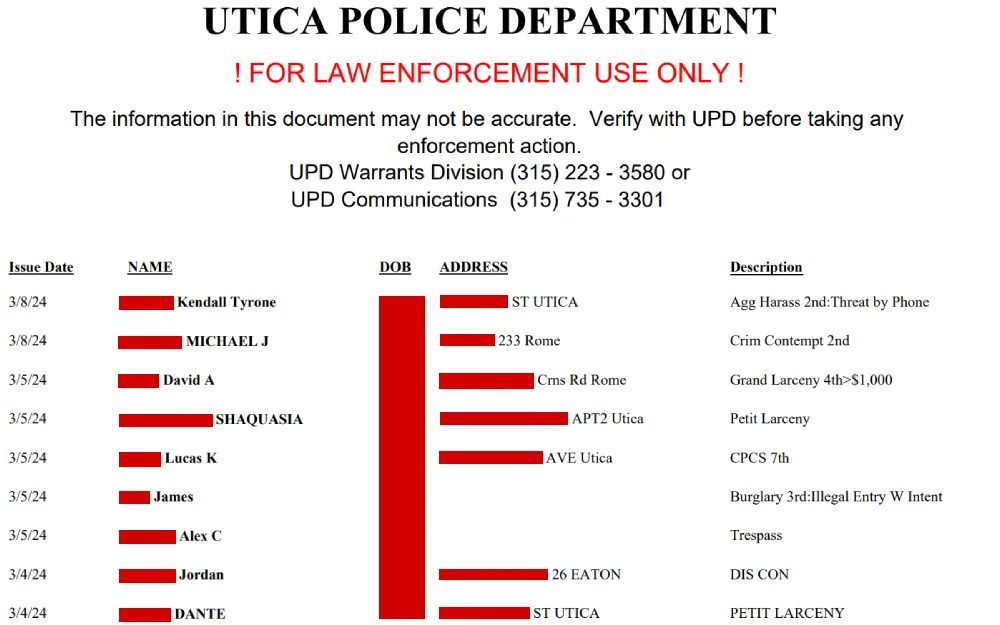
The warrant unit is available by phone at (315) 223-3580 for more information about warrants that may not have been added to the list yet. For in-person inquiries, visit:
Utica Police Department
413 Oriskany Street West
Utica, New York 13502
Retrieve Federal Warrant Information for NY & All Other States
State warrants are handled by state agencies, but federal agencies can also seek warrants of arrest for crimes committed out of state, while traveling between states or for federal offenses that may not be a crime in the state you live in.
The easiest way to access information about federal warrants is often through the Public Access to Court Electronic Records (PACER) program.9
This program allows users to register and run searches using basic and advanced search tools. There’s an option to run nationwide searches or narrow them down to a state or city. PACER isn’t free, but individuals can contact the PACER Service Center at 1-800-676-6856 or by email at [email protected] to inquire about exemption options.
The standard fee is $0.10 per page, which is fairly nominal.
Federal enforcement agencies that may also maintain most wanted lists for those who’ve failed to appear for a court date include the Federal Bureau of Investigation, the Drug Enforcement Agency and the U.S. Marshals Service.10
The U.S. Marshals Service is typically responsible for serving warrants and capturing fugitives rather than seeking to have warrants issued in court. If there’s any reason to suspect you may have a warrant open with any federal agency, take a look at the most wanted lists first.

The best way to obtain warrant information outside of these resources is with the help of a criminal defense attorney. A defense attorney can submit FOIL requests to various federal agencies to ensure there are no unserved warrants pending.
Types of Warrants in New York & Their Definitions
Warrants of arrest are what usually come to mind when someone mentions warrants – but there are many types of warrants, and only some are associated with major crimes.
- Search Warrants: A search warrant is an investigative type of warrant that’s typically served to a person about their property. It may not indicate any crime at all after being served.
- Arrest Warrants: Arrest warrants are issued after someone is investigated and charged with a crime. They’re usually issued shortly after the crime and before the probation hearing.
- Bench Warrants: A bench warrant is typically issued when someone fails to appear in court, either as a defendant or as a compelled witness. Judges can also issue bench warrants for failure to complete required civic duties such as jury duty.
- Parole & Probation Warrants: Those who don’t adhere to the agreement made when getting released on probation or parole may be jailed for the violation. A corrections officer may ask the judge to violate the agreement and issue a parole violation or probation violation warrant.
- Traffic Violations: Most traffic violations don’t result in a warrant, but some involve mandatory court appearances and a trial. Those arrested for a DUI or even for a minor traffic citation may have a mandatory court appearance if their license has too many points and is at risk for suspension.
- Child Support Enforcement: Parents have an obligation to pay support for their children. Failure to do so may result in jail time. Missed child support can result in a warrant issued for the financially liable parent’s arrest.
- Capias & Capias Pro Fine Warrants: When running a warrant search, there may be a Capias or Capias Pro Fine warrant. These are issued when someone makes an agreement with the court to pay fines on a schedule and misses payments. Unless the person can demonstrate financial inability to pay, they may be jailed pending a resolution to the financial liability.
- Tax Warrants: New York State has a system that allows residents to check specifically for warrants issued due to unpaid taxes.11 While warrants don’t typically expire, one of the fastest ways to have these warrants dismissed is by paying any past-due balance.
Addressing Warrants & Reporting Persons of Interest in NY
After running a warrant search and getting a positive result, it’s time to get help. If it’s an arrest warrant, make some quick phone calls. Obtaining legal help and advocacy is the most immediate necessity.
Call a lawyer and get advice on when and how to turn yourself in. Next, notify any family members in advance and discuss the charges and the potential outcome of a trial. Finally, find a bail bondsman who’s willing to help post bail, minimizing any time spent locked up.
If a warrant search shows someone you know is currently a fugitive from justice (possibly unknowingly), there are several possible options available. If it’s a close friend or loved one, pass along the information so they can start getting the legal trouble resolved. If the person with a warrant isn’t safe in the community, it’s a good idea to notify law enforcement.
Call the New York City Crime Stoppers and put in an anonymous report.12 The number is (800) 577-TIPS (8477). A New York warrant search may not catch the most recent court events, so keep checking or get legal counsel if a specific incident may lead to a warrant.
Feel free to check out more details of anyone in the state using the New York free public information lookup instructions and the tutorial on accessing NY arrest and criminal history records.
References
1Office of Temporary and Disability Assistance. (n.d.). Freedom of Information Law (FOIL). Retrieved March 13, 2024, from <https://otda.ny.gov/legal/foil/>
2New York State Unified Court System. (n.d.). Criminal History Record Search. Retrieved March 13, 2024, from <https://ww2.nycourts.gov/apps/chrs/index.shtml>
3New York State Unified Court System. (2022, October). Criminal History Record Search (CHRS) Application. Retrieved March 13, 2024, from <https://ww2.nycourts.gov/sites/default/files/document/files/2022-10/CHRS%20Application%20Form%20Rev.%2010.2022.pdf>
4New York State Department of Corrections and Community Supervision. (2024). Incarcerated Lookup. Retrieved March 13, 2024, from <https://nysdoccslookup.doccs.ny.gov/>
5New York State Unified Court System. (2024). Case Search. Retrieved March 13, 2024, from <https://iapps.courts.state.ny.us/webccos/queenscc/indexSearch>
6New York State Unified Court System. (n.d.). 13th JD – Richmond County (Staten Island). Retrieved March 13, 2024, from <https://ww2.nycourts.gov/courts/13jd/index.shtml>
7Erie County Sheriff’s Office. (2024). Warrants. Retrieved March 13, 2024, from <https://www2.erie.gov/sheriff/index.php?q=warrants>
8City of Utica Police Department. (2024). Warrant List. Retrieved March 13, 2024, from <https://www.cityofutica.com/Assets/Departments/Police/Warrants/warrant%20list%20with%20issue%20date.pdf>
9Public Access to Court Electronic Records (PACER). (2024). Search by Specific Court. Retrieved March 13, 2024, from <https://pacer.uscourts.gov/find-case/search-specific-court>
10Federal Bureau of Investigation. (n.d.). Ten Most Wanted Fugitives. Retrieved March 13, 2024, from <https://www.fbi.gov/wanted/topten>
11New York State Department of Taxation and Finance. (n.d.). New York State Tax Warrants. Retrieved March 13, 2024, from <https://www8.tax.ny.gov/WARR/warrStart>
12NYC 311. (n.d.). Crime Stoppers Tip. Retrieved March 13, 2024, from <https://portal.311.nyc.gov/article/?kanumber=KA-02668>
